Правильное программное обеспечение для управления строительными проектами может оптимизировать процессы, улучшить сотрудничество и обеспечить завершение проектов в срок и в пределах бюджета. Эта статья выделяет топ-10 программ обеспечения для управления строительными проектами в 2026 году, их ключевые функции, преимущества и как они могут удовлетворить конкретные потребности вашей строительной компании.
Что такое программное обеспечение для управления строительными проектами?
Программное обеспечение для управления строительными проектами — это специализированный инструмент, который интегрирует основные функции, такие как планирование, управление затратами, управление документами и распределение ресурсов в одну платформу. Оно помогает оптимизировать планирование, координацию и контроль строительных проектов, предоставляя такие функции, как диаграммы Ганта, Канбан, отслеживание времени и инструменты для сотрудничества. Эти функции позволяют менеджерам проектов отслеживать прогресс, управлять бюджетами, распределять ресурсы и обеспечивать эффективную коммуникацию между членами команды.
Организации могут увеличить видимость проектов, оптимизировать использование ресурсов и улучшить принятие решений, используя это программное обеспечение. Данные и отчеты в реальном времени позволяют лучше контролировать задачи, снижая риски и предотвращая перерасход бюджета. В конечном итоге программное обеспечение для управления строительными проектами является необходимым инструментом для успешного управления проектами в строительной отрасли, помогая обеспечить завершение проектов в срок, в рамках бюджета и в соответствии с установленными стандартами.
Преимущества программного обеспечения для управления строительными проектами
Принятие программного обеспечения для управления строительными проектами предлагает множество преимуществ:
- Улучшенное отслеживание проектов: С помощью мониторинга в реальном времени менеджеры проектов могут отслеживать прогресс на каждом этапе, обеспечивая выполнение задач согласно графику. Эта видимость позволяет вносить немедленные изменения, чтобы держать проект в рамках временных рамок, минимизируя задержки.
- Управление временем: Продвинутые инструменты планирования помогают эффективно планировать и управлять временем, обеспечивая выполнение всех этапов проекта в установленные сроки.
- Контроль затрат: Отслеживая расходы относительно бюджета в реальном времени, программное обеспечение для управления строительными проектами помогает предотвратить перерасход бюджета. Раннее обнаружение отклонений бюджета позволяет вовремя принять корректирующие меры.
- Лучшее управление ресурсами: Эффективное распределение ресурсов имеет решающее значение в строительстве. Программное обеспечение помогает менеджерам назначать задачи на основе доступности и квалификации, снижая потери и максимизируя производительность. Это обеспечивает эффективное использование рабочей силы, материалов и оборудования.
- Улучшенное сотрудничество: Централизованные возможности общения и обмена документами обеспечивают согласованность всех членов команды, от работников на месте до удаленных заинтересованных сторон. Эта единая платформа снижает вероятность недоразумений, способствует командной работе и обеспечивает доступность актуальной информации для всех.
Как выбрать программное обеспечение для управления строительными проектами
Выбор правильного программного обеспечения для управления строительными проектами требует тщательного учета нескольких факторов:
- Удобство использования: Программное обеспечение должно быть очень удобным, предлагая интуитивно понятный интерфейс, который минимизирует кривую обучения. Это особенно важно в строительстве, где у членов команды могут быть различные уровни технической подготовки. Платформа, требующая минимального обучения, может быть быстро принята, что приводит к более быстрой реализации и большей продуктивности.
- Функциональность: Определите конкретные потребности вашего бизнеса. Требуются ли вам продвинутые инструменты планирования, детализированные функции сметного учета или бесшовная интеграция с другим программным обеспечением, например, бухгалтерскими системами? Правильное программное обеспечение должно предлагать функции, соответствующие вашим операционным требованиям, независимо от того, управляете ли вы небольшими жилыми проектами или крупными коммерческими объектами.
- Масштабируемость: По мере роста вашего бизнеса, ваше программное обеспечение должно расти вместе с ним. Убедитесь, что платформа может адаптироваться к увеличению числа проектов, пользователей и объемов данных, не ущемляя производительность.
- Стоимость: Учитывайте общую стоимость владения, включая не только подписные взносы, но и потенциальные расходы на обучение, поддержку и будущие обновления. Программное обеспечение должно обеспечивать хорошее соотношение цены и качества.
Методология
Чтобы определить лучшее программное обеспечение для управления строительными проектами в 2026 году, мы применили комплексный процесс оценки. Наши критерии были разработаны для оценки программного обеспечения с разных сторон, сосредотачиваясь на ключевых аспектах, которые непосредственно влияют на успех проекта.
- Набор функций: Мы тщательно проанализировали основные функции каждого программного обеспечения, включая управление задачами, диаграммы Ганта, отслеживание затрат и другие важные инструменты. Мы рассмотрели, предоставляет ли программное обеспечение продвинутые функции, такие как распределение ресурсов, управление документами и сотрудничество в реальном времени, которые критически важны для сложных строительных проектов.
- Удобство использования: Пользовательский опыт был критическим фактором в нашей оценке. Мы проверили, насколько интуитивно понятным и простым в навигации было программное обеспечение, учитывая различные уровни навыков потенциальных пользователей.
- Масштабируемость: Мы оценили способность программного обеспечения расти вместе с бизнесом, оценив его способность поддерживать увеличивающееся количество проектов и пользователей. Это включало изучение того, может ли программное обеспечение обрабатывать более крупные наборы данных, более сложные проекты и расширяющиеся команды без ухудшения производительности.
- Клиентская поддержка: Надежная клиентская поддержка имеет важное значение для любого программного решения. Мы оценили доступность и оперативность команд поддержки.
- Цены: Мы сравнили соотношение цены и качества различных ценовых моделей, учитывая не только первоначальные затраты, но и долгосрочные инвестиции. Мы проанализировали, какие функции включены в различные ценовые категории, чтобы убедиться, что программное обеспечение предоставляет хорошую ценность в отношении своих возможностей.
Кто использует программное обеспечение для управления строительными проектами?
Программное обеспечение для управления строительными проектами широко используется различными специалистами в строительной отрасли:
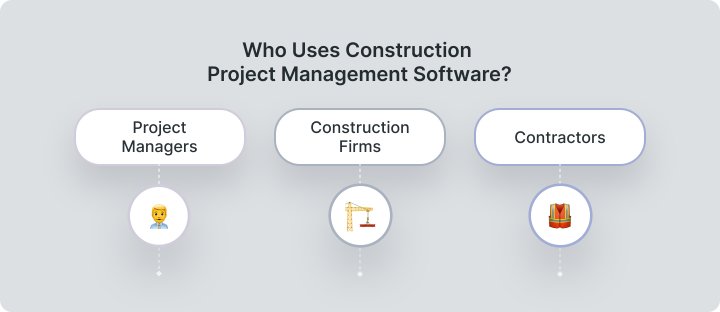
- Менеджеры проектов: Эти инструменты незаменимы для менеджеров проектов, которые контролируют планирование, выполнение и завершение строительных проектов. Они полагаются на программное обеспечение для отслеживания прогресса, управления графиками, распределения ресурсов и обеспечения завершения всех задач в срок.
- Строительные компании: Для строительных компаний, обслуживающих несколько проектов одновременно, это программное обеспечение помогает оптимизировать операции, предоставляя централизованную платформу для управления ресурсами, отслеживания бюджета и обеспечения выполнения проектов в срок.
- Подрядчики: Подрядчики используют программное обеспечение для координации работы с субподрядчиками, мониторинга временных рамок проекта и эффективного управления затратами. Оно помогает убедиться, что все аспекты проекта слаженно работают и движутся по плану.
10 лучших программ для управления строительными проектами
Начнем с быстрой таблицы сжатия, чтобы увидеть ключевые преимущества и функционал каждого программного обеспечения в нашем списке:
Название | Ключевые функции | Лучше всего для | Цены |
Worksection | Управление задачами, отслеживание времени, диаграмма Ганта, Канбан, отчетность, календарь, контроль доступа | Универсально подходит для различных строительных проектов | Начинается с $69/месяц |
Procore | Управление проектами, финансы, качество и безопасность | Крупные предприятия, нуждающиеся в комплексном решении | Цены доступны по запросу |
Buildertrend | Планирование, бюджетирование, связь с клиентами | Жилые строительные проекты | Начинается с $199/месяц |
CoConstruct | Управление проектами, связь с клиентами, финансы | Строители и обновляющие дома | Начинается с $99/месяц |
PlanGrid | Управление чертежами, контроль документов | Крупные проекты | Начинается с $49/месяц |
Monday.com | Настраиваемые рабочие процессы, отслеживание проектов | Различные отрасли, включая строительство | Начинается с $10.05/пользователь/месяц |
Smartsheet | Диаграммы Ганта, отчетность, управление ресурсами | Сложные строительные проекты | Начинается с $9/пользователь/месяц |
Asana | Управление задачами, временные рамки, сотрудничество | Универсальное управление проектами в различных отраслях | Начинается с $10.99/пользователь/месяц |
Microsoft Project | Подробное планирование, управление ресурсами, диаграммы Ганта | Знакомство с продуктами Microsoft | Начинается с $10/пользователь/месяц |
Fieldwire | Управление задачами, просмотр чертежей, сотрудничество | Полевое управление для строительных команд | Начинается с $39/пользователь/месяц |
Worksection
Worksection — это универсальное средство управления проектами, разработанное для оптимизации сотрудничества и отслеживания проектов, что делает его отличным выбором для строительных проектов. Его мощные функции включают диаграммы Ганта, отслеживание времени и инструменты для бюджетирования, которые позволяют командам эффективно планировать, выполнять и контролировать прогресс проекта.
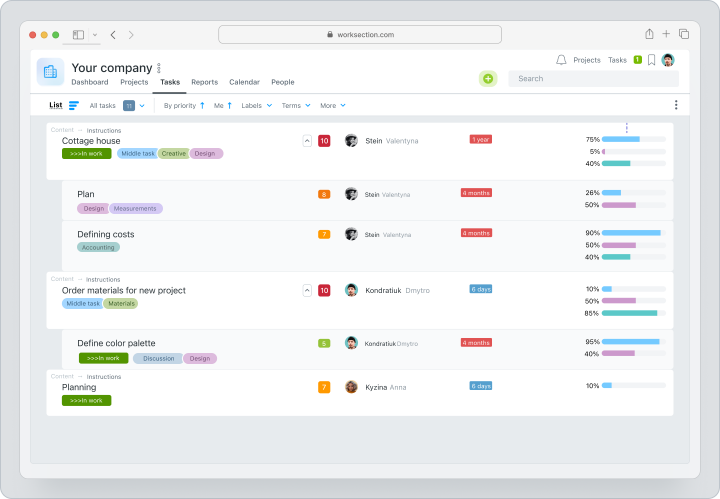
Интуитивно понятный интерфейс Worksection обеспечивает легкость использования, даже для тех, кто впервые сталкивается с программным обеспечением для управления проектами, минимизируя кривую обучения. Сервис также поддерживает бесшовную коммуникацию и обмен документами, что способствует улучшению работы команды. Цены начинаются с $69 в месяц, с бесплатным пробным периодом, что делает его доступным для бизнеса различных размеров.
Procore
Procore — это комплексная платформа для управления строительными проектами, которая превосходит в интеграции управления проектами, финансами, качеством и безопасностью в одно целое, согласованное решение. Оно высокомасштабируемо и подходит для предприятий любого размера, от небольших компаний до крупных корпораций, которые одновременно обрабатывают несколько сложных проектов.
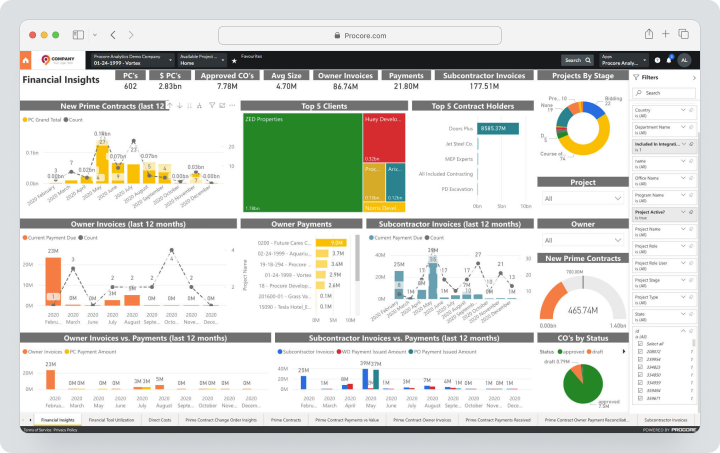
Расширенный набор функций Procore включает инструменты для совместной работы в реальном времени, настраиваемые рабочие процессы и детализированную отчетность, что обеспечивает тщательное управление всеми аспектами проекта. Платформа постоянно обновляется, чтобы учесть последние лучшие практики отрасли. С надежной поддержкой клиентов и гибкими вариантами развертывания Procore предлагает цены, доступные по запросу.
Buildertrend
Buildertrend специально разработан для жилых строительных проектов, предлагая комплексный набор функций, таких как планирование проектов, бюджетирование и инструменты для связи с клиентами. Его облачная природа обеспечивает доступ к данным проекта из любого места, позволяя командам оставаться на связи и в курсе событий, независимо от местоположения.
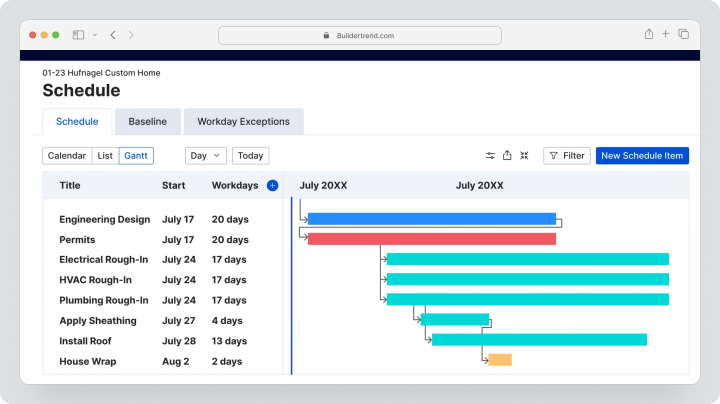
Buildertrend также поддерживает управление лидами, обработку смены заказов и планирование субподрядчиков, что делает его универсальным инструментом для управления сложностями жилого строительства. Его интуитивно понятный интерфейс предназначен для удобства использования, даже для тех, кто имеет ограниченную техническую подготовку. Цены начинаются с $199 в месяц.
CoConstruct
CoConstruct является популярным выбором среди строителей и обновляющих, предлагая мощный набор инструментов для управления проектами, связи с клиентами и финансового управления. Программное обеспечение выделяется своей бесшовной интеграцией с QuickBooks, упрощая процесс бухгалтерского учета и обеспечивая, чтобы финансовые данные всегда были актуальными.
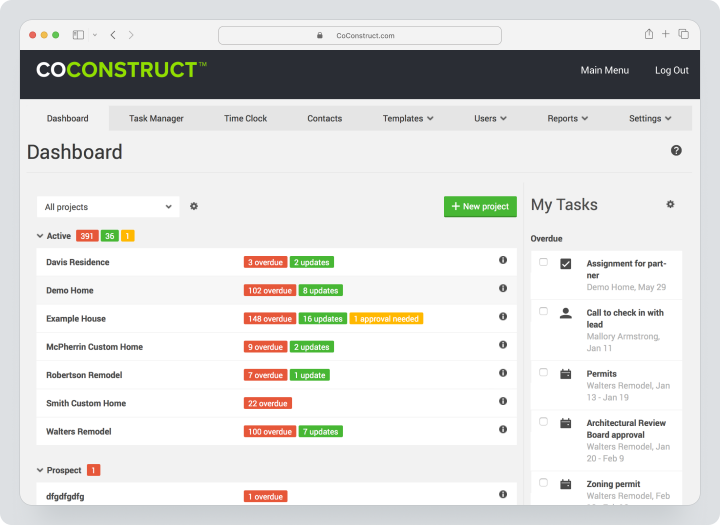
CoConstruct также предоставляет функции для управления заявками, предложениями и выборами клиентов, что упрощает администрирование строительных проектов. Его интуитивно понятный интерфейс и сильная поддержка клиентов делают его доступным как для опытных профессионалов, так и для новичков. Цены начинаются с $99 в месяц, что отражает его комплексный набор функций.
PlanGrid
PlanGrid — это программное обеспечение для повышения производительности в строительстве, предназначенное для улучшения эффективности крупных строительных проектов. Оно позволяет пользователям управлять чертежами, документами и полевыми отчетами в реальном времени, обеспечивая доступ ко всей последней информации о проекте для всех членов команды.
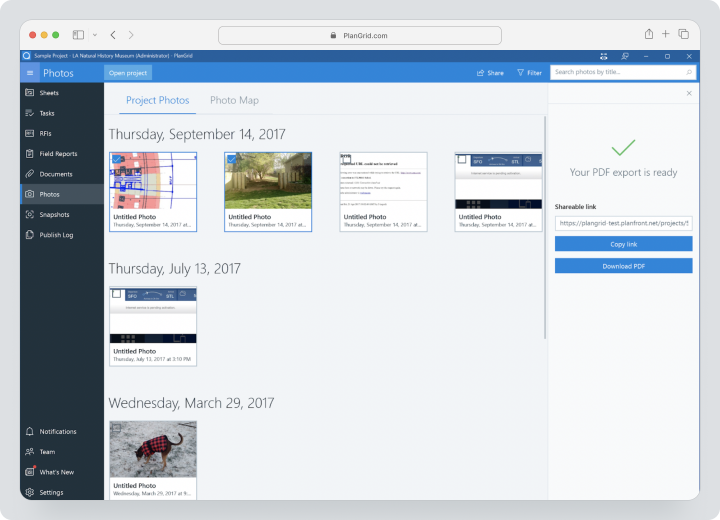
Программное обеспечение также включает мощные инструменты для отслеживания проблем, контрольных списков и управления версиями документов, что имеет критическое значение для поддержания точности и качества проекта. Мобильные возможности PlanGrid позволяют командам получать доступ к данным проекта из любого места, улучшая сотрудничество и принятие решений на месте. Цены начинаются с $49 за пользователя в месяц, что делает его экономически выгодным решением для крупных команд.
Monday.com
Monday.com — это гибкая платформа для управления проектами, которая предлагает настраиваемые рабочие процессы, что делает ее подходящей для различных отраслей, включая строительство. Его визуальные инструменты отслеживания проектов позволяют пользователям создавать детализированные временные линии, назначать задачи и контролировать прогресс через интуитивные панели управления.
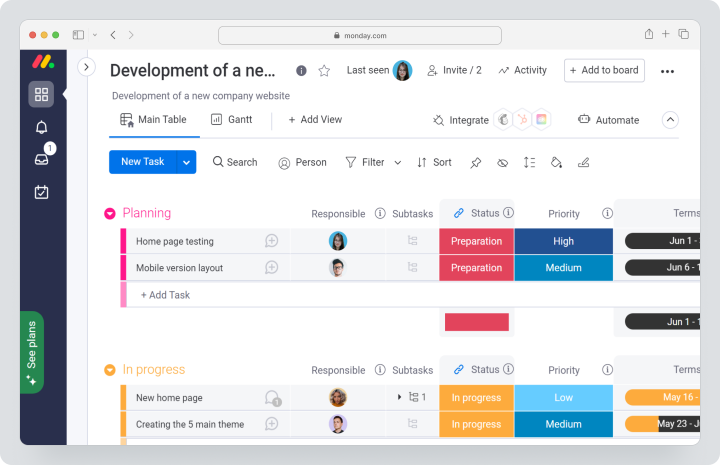
Monday.com особенно ценится за свою адаптивность, позволяя командам настраивать платформу в соответствии с их специфическими потребностями. Цены начинаются с $10.05 за пользователя в месяц, что делает его доступным вариантом для малых и средних предприятий.
Smartsheet
Smartsheet предоставляет динамичную и мощную платформу для управления проектами, предлагая инструменты, такие как диаграммы Ганта, отчетность и управление ресурсами, которые необходимы для управления сложными строительными проектами. Интерфейс программного обеспечения, основанный на сетке, напоминает электронную таблицу, что делает его легким для пользователей для организации и отслеживания данных проекта.
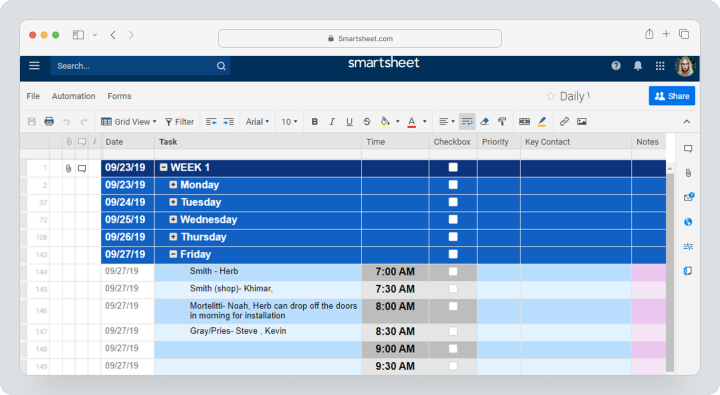
Smartsheet также предлагает мощные функции автоматизации, позволяя командам автоматизировать рутинные задачи и сосредотачиваться на более стратегических мероприятиях. Его возможность интеграции с широким спектром других инструментов, таких как Microsoft Office и Salesforce, дополнительно улучшает его полезность. Цены начинаются с $9 за пользователя в месяц, предлагая отличное соотношение цены и качества для комплексного управления проектами.
Asana
Asana — это известный инструмент для управления проектами, который превосходит в управлении задачами, предлагая такие функции, как временные рамки, инструменты для совместной работы в команде и управление загруженностью, что делает его универсальным выбором для строительных проектов. Интуитивно понятный интерфейс Asana и гибкие виды проектов, такие как список, доска и календарный вид, позволяют командам организовывать задачи в соответствии с их предпочтительным рабочим процессом. Платформа также поддерживает интеграции с широким спектром других инструментов, включая Dropbox и Google Workspace, что улучшает ее функциональность.
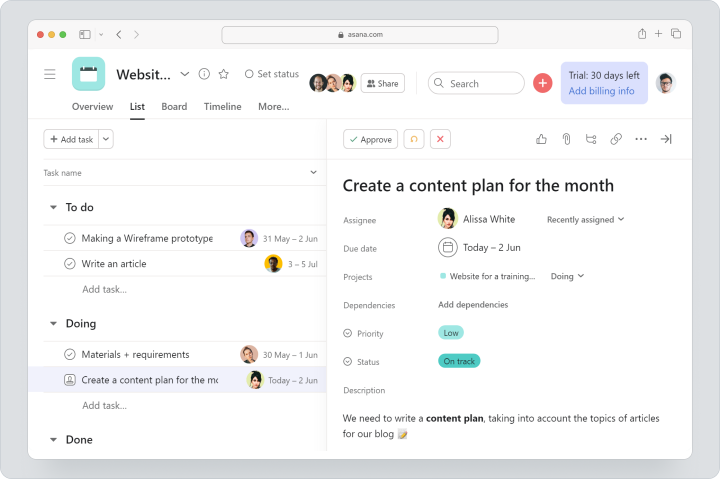
Asana особенно эффективна для команд, которым необходимо управлять сложными зависимостями задач и отслеживать вехи проекта. Цены начинаются с $10.99 за пользователя в месяц.
Microsoft Project
Microsoft Project — это мощный инструмент для управления проектами, который широко признан благодаря своим функциям детализированного планирования, управления ресурсами и диаграмм Ганта. Это отличный вариант для строительных компаний, которые уже знакомы с набором продуктов Microsoft, поскольку он seamlessly интегрируется с другими инструментами Microsoft, такими как Excel и SharePoint.
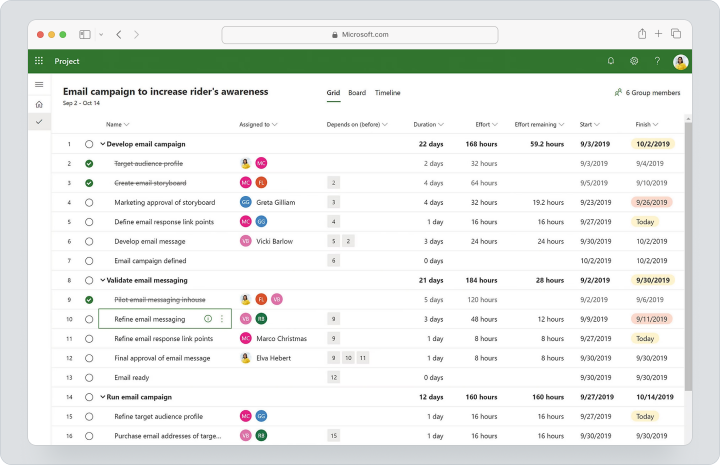
Мощные возможности планирования Microsoft Project позволяют точно контролировать временные рамки проекта, ресурсы и бюджеты, что делает его идеальным для сложных строительных проектов. Программное обеспечение также предлагает ряд шаблонов и опций настройки, чтобы соответствовать различным потребностям проекта. Цены начинаются с $10 за пользователя в месяц, что делает его доступным для команд любого размера.
Fieldwire
Fieldwire — это решение для управления в полевых условиях, специально разработанное для строительных команд, предлагающее множество функций для повышения сотрудничества на месте и отслеживания проектов. Программное обеспечение включает инструменты для управления задачами, просмотра чертежей и совместной работы в реальном времени, позволяя членам команды эффективно координировать действия с поля.
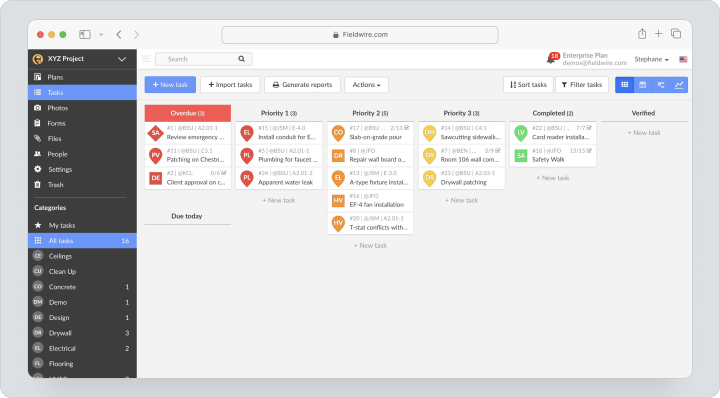
Способность Fieldwire синхронизировать данные на всех устройствах обеспечивает доступ всем к самой актуальной информации о проекте, снижая количество ошибок и улучшая принятие решений. Платформа также поддерживает офлайн-доступ, что делает ее идеальной для использования в местах с ограниченным интернет-соединением. Цены начинаются с $39 за пользователя в месяц, что предоставляет отличную ценность для строительных команд.
Часто задаваемые вопросы
Что такое программное обеспечение для управления строительными проектами?
Программное обеспечение для управления строительными проектами — это инструмент, который помогает управлять и оптимизировать различные аспекты строительных проектов, от планирования до отслеживания затрат.
Что делает программное обеспечение для управления строительными проектами?
Оно интегрирует основные функции управления проектами, такие как планирование задач, распределение ресурсов, бюджетирование и сотрудничество команды в одной платформе, улучшая эффективность проекта и его успех.